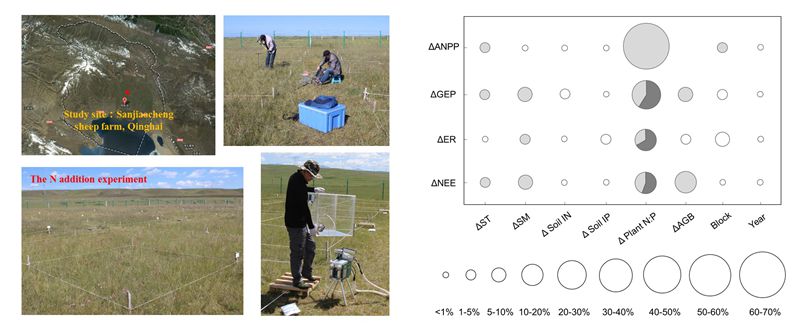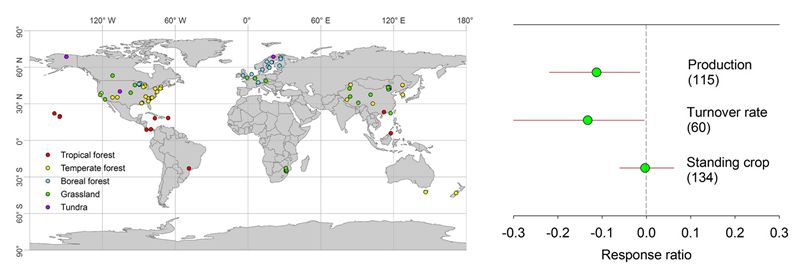Unprecedented levels of nitrogen (N) have entered terrestrial ecosystems, which exerts great influence on carbon (C) exchange between the atmosphere and terrestrial biosphere. On the one hand, increasing N input may stimulate plant growth and benefit ecosystem C uptake. On the other hand, external N addition is also reported to enhance the respiration of plants and soil biota. To date, information is still lacking on the regulating mechanisms of ecosystem C exchange under gradually increasing N additions, and the overall effects of N inputs on root production and turnover at broad scale.
To address the above issues, YANG’s group conducted a field manipulative experiment with eight N addition levels in a Tibetan alpine steppe. They examined the responses of gross ecosystem productivity (GEP), aboveground net primary production (ANPP), ecosystem respiration (ER) and net ecosystem exchange (NEE) to gradually increasing N inputs, and also explored the relationships of these C flux parameters with abiotic and biotic factors. Their results showed that the GEP, ANPP, ER and NEE all exhibited nonlinear responses to increasing N additions. Further analysis demonstrated that the plant N: phosphorous (P) ratio played a dominate role in shaping these C exchange processes. By contrast, soil temperature and moisture were only secondary predictors for the changes in ANPP, GEP, ER and NEE along this N addition gradient. These results indicate that the N-induced N-P imbalance has significant impacts on ecosystem C exchange. Further, the researchers performed a meta-analysis to assess the central tendencies of root production, turnover rate and standing crop with respect to the experimental addition of N. The results demonstrated that, on aggregate, the addition of N significantly decreased root production and turnover rate at the global scale, which challenged the early hypothesis that increasing soil N availability would stimulate root production and turnover rate based on natural N gradient studies. The above findings provide novel aspects for understanding of C cycles under the scenarios of global N enrichment, and benchmarks for parameterization of Earth System Models.
These results were recently online published in the Global Change Biology (http://onlinelibrary.wiley.com/doi/10.1111/gcb.13789/full) and Global Ecology and Biogeography (http://onlinelibrary.wiley.com/doi/10.1111/geb.12508/full). The assistant professor PENG Yunfeng of YANG’s group is the first author of both papers. The work was supported by the National Natural Science Foundation of China, Chinese Academy of Sciences-Peking University Pioneer Collaboration Team.
CONTACT INFO:
YANG Yuanhe
State Key Laboratory of Vegetation & Environmental Change
Institute of Botany,
Chinese Academy of Sciences,
20 Nanxincun, Xiangshan, Beijing 100093, China

The plant N: P ratio played a dominate role in shaping ecosystem C fluxes under N enrichment

The addition of N significantly decreased root production and turnover rate at the global scale
Unprecedented levels of nitrogen (N) have entered terrestrial ecosystems, which exerts great influence on carbon (C) exchange between the atmosphere and terrestrial biosphere. On the one hand, increasing N input may stimulate plant growth and benefit ecosystem C uptake. On the other hand, external N addition is also reported to enhance the respiration of plants and soil biota. To date, information is still lacking on the regulating mechanisms of ecosystem C exchange under gradually increasing N additions, and the overall effects of N inputs on root production and turnover at broad scale.
To address the above issues, YANG’s group conducted a field manipulative experiment with eight N addition levels in a Tibetan alpine steppe. They examined the responses of gross ecosystem productivity (GEP), aboveground net primary production (ANPP), ecosystem respiration (ER) and net ecosystem exchange (NEE) to gradually increasing N inputs, and also explored the relationships of these C flux parameters with abiotic and biotic factors. Their results showed that the GEP, ANPP, ER and NEE all exhibited nonlinear responses to increasing N additions. Further analysis demonstrated that the plant N: phosphorous (P) ratio played a dominate role in shaping these C exchange processes. By contrast, soil temperature and moisture were only secondary predictors for the changes in ANPP, GEP, ER and NEE along this N addition gradient. These results indicate that the N-induced N-P imbalance has significant impacts on ecosystem C exchange. Further, the researchers performed a meta-analysis to assess the central tendencies of root production, turnover rate and standing crop with respect to the experimental addition of N. The results demonstrated that, on aggregate, the addition of N significantly decreased root production and turnover rate at the global scale, which challenged the early hypothesis that increasing soil N availability would stimulate root production and turnover rate based on natural N gradient studies. The above findings provide novel aspects for understanding of C cycles under the scenarios of global N enrichment, and benchmarks for parameterization of Earth System Models.
These results were recently online published in the Global Change Biology (http://onlinelibrary.wiley.com/doi/10.1111/gcb.13789/full) and Global Ecology and Biogeography (http://onlinelibrary.wiley.com/doi/10.1111/geb.12508/full). The assistant professor PENG Yunfeng of YANG’s group is the first author of both papers. The work was supported by the National Natural Science Foundation of China, Chinese Academy of Sciences-Peking University Pioneer Collaboration Team.
CONTACT INFO:
YANG Yuanhe
State Key Laboratory of Vegetation & Environmental Change
Institute of Botany,
Chinese Academy of Sciences,
20 Nanxincun, Xiangshan, Beijing 100093, China

The plant N: P ratio played a dominate role in shaping ecosystem C fluxes under N enrichment

The addition of N significantly decreased root production and turnover rate at the global scale
